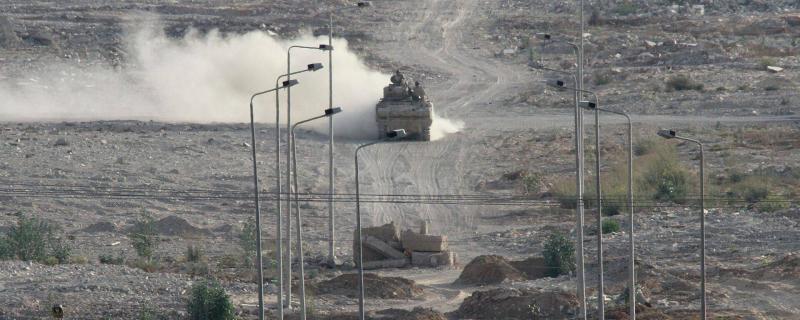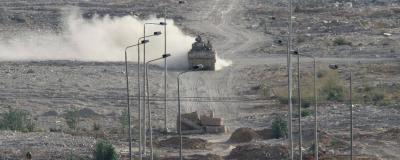Israeli Prime Minister Benjamin Netanyahu stated on Saturday that his country must fully control the Philadelphia corridor along the border between Egypt and Gaza to ensure "disarmament" in the area, while the military continued its incursion into central and southern Gaza. In a press conference, Netanyahu said, “The Philadelphia corridor, or more accurately the southern stopping point in Gaza, must be under our control. It must be sealed off. Clearly, any other arrangement will not guarantee the disarmament we seek.”
**What is the "Philadelphia Corridor"?**
The Philadelphia corridor, also known as the "Salah al-Din corridor," extends along the border between Gaza and Egypt and is part of a buffer zone according to the Camp David peace agreement between Egypt and Israel in 1979. It measures 14 kilometers in length. This agreement allows Israel and Egypt to deploy a limited number of troops and specific types of weapons and equipment along the corridor to patrol the Egyptian side, aiming to prevent smuggling, infiltration, and other criminal activities.
The agreement enables an Israeli presence within this buffer zone known as the Philadelphia corridor, which falls under area "D" as per the first annex, the protocol concerning the Israeli withdrawal and security arrangements, allowing for a limited Israeli military force of four infantry battalions, field fortifications, and United Nations observers. The Israeli force does not include tanks, artillery, or missiles except for individual "ground-to-air" missiles. The Israeli infantry in this area can possess up to 180 military vehicles, with an overall count of infantry not exceeding 4,000 personnel.
In area "C" of the agreement, the presence of UN forces and Egyptian civilian police is permitted, while area "B" allows for Egyptian border units of four battalions equipped with light weapons. Area "A" is where military forces from an infantry division and an armored brigade, along with artillery battalions, can be present, not exceeding 22,000 Egyptian troops.
Israeli forces controlled this area "D," including the Philadelphia corridor, until their withdrawal in 2005 when they handed it over to the Palestinian Authority. A new agreement was signed to arrange the Egyptian presence of border guard forces, known as the "Philadelphia Agreement," which aligned with the "Crossings Agreement" signed in the same year.
**Philadelphie Agreement Related to Camp David**
The Philadelphia Agreement was signed with Egypt as an extension of the Camp David Agreement, which designated 14 kilometers as a buffer zone along the border between Egypt and Gaza. This agreement was made after the Israeli Knesset approved in 2004 a decision to withdraw all Israeli forces from the Gaza Strip, which took effect in August 2005.
The agreement facilitated Israeli-Egyptian security coordination and allowed for the presence of Egyptian border guard forces along the Philadelphia strip and joint patrols by both parties. It stipulated that the Egyptian presence in this area is “to combat terrorism and border infiltration” and not intended for any military purpose, ensuring no changes to the main peace agreement with Egypt by maintaining the demilitarized area "C," and regarded the Philadelphia Agreement as a "security protocol" to guarantee no Egyptian military presence near the Israeli border.
Under an agreement with Israel, 750 members of the Egyptian paramilitary forces patrol the border armed with light weapons and armored vehicles, in addition to an unspecified number of unarmed police forces.
Two years before their withdrawal, Israelis constructed a concrete and metal wall seven kilometers long and eight meters high to separate parts of the city of Rafah, which was divided into two after the Camp David Agreement, between Egypt and Gaza.
In November 2005, Israel signed a "Crossings Agreement" with the Palestinian Authority to regulate the movement between them, including the Rafah crossing that connects Egypt and Gaza. The agreement stated that the Rafah crossing will be operated by the Palestinian Authority on its side and by Egypt on its end according to international standards and in accordance with the laws. The crossing designated for people is located away from the center of Rafah city, while refugee camps exist on both sides of the border.
**Why Does Israel Want to Control the Philadelphia Corridor?**
Israeli Prime Minister Netanyahu did not elaborate on the details of controlling the Philadelphia corridor, but if accomplished, such a move would effectively represent a retreat from Israel’s withdrawal from Gaza in 2005, placing the enclave under exclusive Israeli control after years of management by Hamas. An analysis published by the Israeli channel "I24NEWS" stated that the Israeli army's movement towards the Philadelphia corridor aims to separate the Gaza Strip from the Sinai Desert and Egypt, according to military experts.
It noted that Israel seeks to secure its southern border to prevent it from "becoming a conduit for supplying Palestinian factions with weapons," thus necessitating continued cooperation with Egypt and maintaining peace with Cairo.
No official statements have been issued from Egypt to comment on Netanyahu's remarks, but Egyptian member of parliament and writer Mustafa Bakri stated in a post on the platform "X" that the Israeli Prime Minister's statements are "a blatant aggression against the peace agreement between the two countries," warning him against "approaching the border, which is a red line." He called on the Egyptian authorities to issue "an official protest and a public warning, as this represents a violation of the peace agreement signed between the two countries, an aggression against Egyptian sovereignty, a choking of Gaza that would make it live in a large prison, imposing a permanent siege, and opening the path for the displacement of Palestinians to Sinai."




